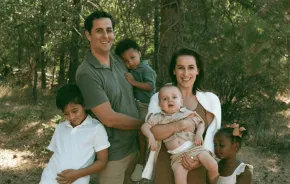Mimi
Tang wants parents to view learning as a team effort. For education to
work well, "everyone must participate," says Tang, assistant director
of lower school admissions at The Bush School in Seattle.
Her
observation is echoed by many of today's educators, who point to
"collaboration" as academia's latest buzzword. "It's about building the
community of learning," Tang says. "The teacher is the leader, but the
parent is also involved in the relationship. This is a democratic
process."
Jean Anthony, principal of West Mercer Elementary School on Mercer
Island, suggests parents find a communication approach that works for
them and for their child's teacher -- and then stick with it. "We want
parents very much in the picture," she says. "They should be there, be
alert, and be aware of what's going on."
And they should do it all without coming on too strong.
The parent-teacher relationship is a curious one. If parents hang back,
they're labeled disinterested. But over-the-top, forever-present folks
are every teacher's bad dream.
"There are parents we have to help exit, and parents who try to tell
the teacher how to teach," Anthony says. But some parents make a
concerted effort to learn what's going on at school, she notes. "They
help their child by reinforcing what the teacher does in the classroom."
The new parent-teacher relationship
Face it: The days when parents simply shuttled their children to
school, signed the report card and exchanged pleasantries with the
teacher at open house are long gone.
Today's catchphrase seems to be, "We're in this together."
What's changed? The way parents view their child's teachers, for
starters. "People live farther from their families of origin now," Tang
says. "With no support system nearby, they come to teachers. Who else
do you look to for parenting advice?"
Often, parents looked to Tang, a former first- and second-grade
teacher. Questions would range from, "What time should my daughter go
to bed at night?" to "How do I say 'no' to my son?"
"Teachers become important advocates in the journey of child rearing,"
she says. "Sometimes, parents just want their hands held. But most
often, they really need to know, is my child normal?"
Parents also need to understand the way the classroom works. "We're
teaching kids differently now," Anthony says. "Parents can't assume
their child's instruction will be the same as it was for them.
Sometimes, they'll email or call and say, 'What's going on?'"
Gary Tubbs views the parent-teacher connection as a critical
partnership. "We are a diverse population," says Tubbs, co-principal of
The New School at South Shore in Seattle. "There are different kinds of
cultures, different learning styles, different backgrounds. We have to
be very open to learning about kids from parents."
The New School at South Shore -- created three years ago through a
private foundation/Seattle Public Schools cooperative effort --
stresses "nurture balanced with rigor," Tubbs explains. "When kids feel
good about coming to school, they are relaxed and tenacious about their
learning."
That's one reason the school's staff works to keep parents involved
through home visits and parenting classes. "Being inclusive is part of
the philosophy of the school," Tubbs says. "We try to operate from our
heart."
Communicating: do's, don'ts
But lacking an organized outreach program like The New School's, how
can parents forge healthy relationships with their children's teachers?
Here's what these educators -- Anthony, Tang and Tubbs -- suggest:
- Ask
the teacher how he or she likes to communicate. "Some teachers send
home newsletters, other use email," Anthony says. Though teachers may
welcome email, they don't welcome parents who overuse it. - Recognize
that your own school experiences color the way you view your child's.
"The invisible baggage we bring with us when we step into the classroom
informs everything," Tang says. "Appreciate that -- and then move
forward." - Realize your child is not the only student the teacher is caring for.
- Find out how the teacher feels about home phone calls. Some like them; for others, they're intrusive.
- Respect
the teacher's instructional time. That means avoiding what Tubbs calls,
"the flyby conference on the way to getting your latte." - Share your contact information and find out how to maintain contact without disrupting your child's class.
- Stay
in touch. "Today, there is so much to learn, and so many expectations,"
Tubbs says. "It's more essential than ever that parents and teachers
work in partnership."
Linda Morgan writes frequently on education issues for ParentMap.









